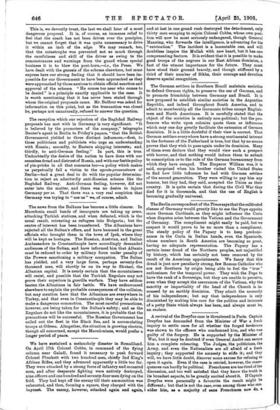We have sustained a melancholy disaster in Somaliland. On April
17th Colonel Cobbe, in command of the flying column near Galadi, found it necessary to push forward Colonel Plunkett with two hundred men, chiefly 2nd King's African Rifles, and they advanced apparently a little too far. They were attacked by a strong force of infantry and mounted men, and after desperate fighting were entirely destroyed, nine officers and one hundred and seventy-four men dying on the field. They had kept off the enemy till their ammunition was exhausted, and then, forming a square, they charged with the bayonet. The enemy, however, attacked again and again, and at last in one grand rush destroyed the detachment, only thirty men escaping to rejoin Colonel Cobbe, whose own posi. tion will now be most seriously endangered, though General Manning, who forwards the intelligence, is advancing for his " extrication." The incident is a lamentable one, and will doubtless inspire the Mullah with new heart, but it has one compensating feature. It is evident that it is possible to make good troops of the negroes in our East African dominion, a fact of the utmost importance for the future. They must have stood their ground bravely, and though stiffened by a third of their number of Sikhs, their courage and devotion deserve special recognition.


























































 Previous page
Previous page